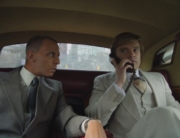How many alternative history stories have there been of the attempts to assassinate Hitler? The absorbing and gripping 13 Minutes would seem like just another fictional film in the genre if this early near miss wasn’t all true and carried out by one regular guy who saw the disturbing impact of the rise of Nazism on his small German town.
Writer/producer Fred Breinersdorfer directed Sophie Scholl: The Final Days (2005), the renowned film about the more recognized White Rose student protesters in 1943 Munich. He teams up with director Oliver Hirschbiegel, acclaimed for Downfall (2004) about Hitler’s last days, for his first German film in nine years. They accomplish a lot more than the thrilling moments of the opening scenes. Their overarching theme is the importance of individual conviction and the decision to take action when no one else will, an idea that goes beyond this specific historical setting.
In November 1939, Georg Elser (Christian Friedel) is completing installation of a complicated bomb and timing device behind the dais of the Munich Beer Hall, two nights before Hitler will lead the Nazis in their annual commemoration of the anniversary of the bloody 1923 putsch when they first tried to seize power. Elser expects to get away to Switzerland before the bomb is timed to go off, but is apprehended instead. The chief of the criminal police, Arthur Nebe (Burghart Klaussner), and the Gestapo head, Heinrich Müller (Johann von Bülow), forcefully interrogate him about why he was carrying suspicious equipment to the Swiss border. Viewers then learn the biographical context of how a lone wolf carpenter committed an audacious act.
The Elser family is seen as more pacifist than their increasingly nationalist neighbors in southwestern Germany. Their ostracism could be because they refrain from participating in local militaristic parades, and also because Elser’s abusive father is the town drunk. Elser goes off to a variety of journeyman jobs and plays in bands at taverns and lake resorts, with sexy flings along the way, bathed in golden light by cinematographer Judith Kaufmann. He most enjoys training as a clockmaker and an affair with the married Elsa (Katharina Schüttler).
When times get tough, and the lighting darker, he has to return home to help his mother with the failing family business, and his best friend, Josef Schurr (David Zimmerschied), tries to rouse his political consciousness to support the Communist Party (KPD). Elser turns away from the KPD battling the Nazis in the streets, yet he joins Josef in making graffiti at night on the party’s behalf . The local bully they grew up with is now strutting around in Nazi gear (that’s a given in all such films set in this period), and he witnesses a traditional festival and local cinema co-opted for Nazi party rallies–and Josef being arrested along with the other Communist activists. Josef sneaks out one night and lets Elser know he’s now serving in a forced labor camp, where Jews and Gypsies aren’t getting out. Elser’s family loses their house, and he finds work at a local factory making arms, though that’s banned under the treaty that ended World War I. It’s a job he finds abhorrent, yet now he can afford to move in as Elsa’s lodger, living under the same roof with her violently jealous husband.
In the interrogations with the two Nazis, who are rising stars in the Reich, Elser insists that his determination to strike at the top of the party hierarchy was his own plan, and not a conspiracy. In a flashback to November 1938, he despairs over the Munich Pact that recognized the Nazi occupation of Czech territory, and he becomes convinced no one and no country is stopping Hitler. He travels more than 60 miles to the 15th putsch anniversary to watch Nazis in full exultation, and realizes how Hitler could be bombed at that location. The extended scenes of his meticulous year of planning are a grim catalog of details (this is no Oceans 11), from protectively breaking up with the now-divorced Elsa to securing fuses and detonators and designing a timer. He diagrams everything for his incredulous torturers to convince them to spare his arrested co-workers, friends, and family. In anguish, he learns that the beer hall schedule had changed by 13 minutes, and his plan foiled.
Why isn’t Elser’s action better known? In contrast, the conspirators in the failed 1944 assassination plot (which, ironically, included the head of police Arthur Nebe) have been much filmed, and last year’s The People vs. Fritz Bauer noted that one of Bauer’s first acts as a state prosecutor was to pardon them. Only in the last 20 years have there been various tributes in Germany and TV docudramas about Elser. In Sergei Loznitsa’s observational Austerlitz, still on the festival circuit, tourists visit Dachau Concentration Camp while one guide valiantly tries to interest the day-trippers in Elser’s daring act and points out his solitary prison cell that was the focus of much Nazi denigrating propaganda and the spot where Elser was executed days before the war ended. The apathetic group has no idea who Elser was. Hopefully, the informative and revealing 13 Minutes will change those attitudes.







Leave A Comment